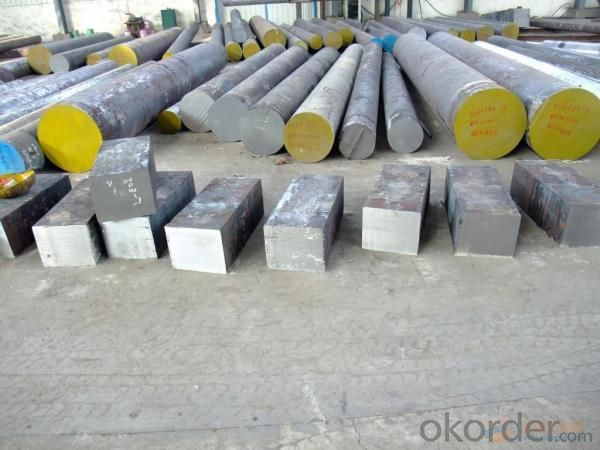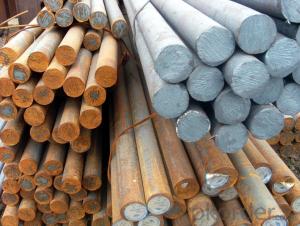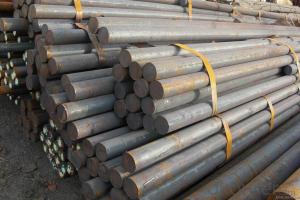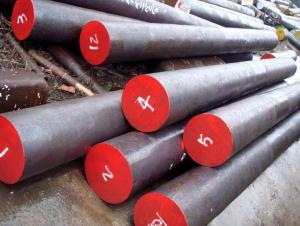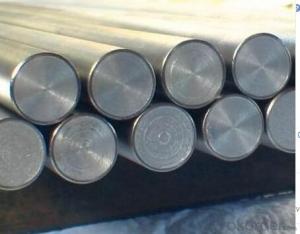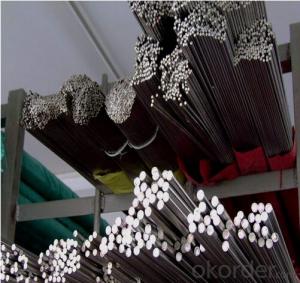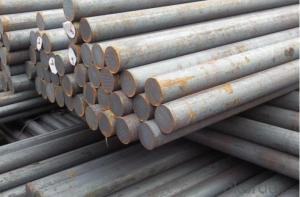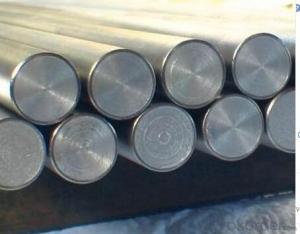Bearing Steel GCr15
- Loading Port:
- China Main Port
- Payment Terms:
- TT or LC
- Min Order Qty:
- 50MT m.t.
- Supply Capability:
- 500000tons/YEAR m.t./month
OKorder Service Pledge
OKorder Financial Service
You Might Also Like
Specifications of Bearing Steel GCr15
1. Dimensional sizes: Thickness: 14~100mm.Length:3000~5800mm,Diameter :14-500mm
2.Chemical composition:
C | Si | Mn | Cr | Ni | Cu |
Equal or less than | |||||
0.95-1.05 | 0.15-0.35 | 0.20-0.40 | Cr:1.30-1.65 | 0.30 | 0.25 |
3. Grade: SAE51200/ GCr15 / 100cr6
4. Heat Treatment:
Soft annealing: heat to 680-720°C, cool slowly.
Hardness after annealing: Max. 241 HB
Hardening: 820 - 850 °C
Normalizing temperature: 840-880°C
Tempering: 540-680°C
5. Surface requirements: Black, grinding, bright, polish
6. Characters:
1) Comprehensive properties
2) Good performance in cutting and processing after spheroids annealing
3) High hardness and homogenization after quenching and tempering
4) High abrasive resistance and fatigue resistance
7. Payment terms: T/T or L/C at sight
Usage & Applications of Bearing Steel GCr15
Our products have been used in all kinds of areas, such as aviation, aerospace, navigation, nuclear, energy, chemical industry, electronic information, petrochemical, automotive, instrument and meter, Communication ,transportation, and medical instruments, etc. Bearing ring,steel rolling mill ,machinery, 100Cr6 bearing steel ball is widely used in high-speed and low-noise bearing, bicycle, motorcycle, automobile, bags, electronics.
Packaging & Delivery of Bearing Steel GCr15
Mark: Heat No. will be cold stamped and Steel grade, diameter (mm), length (mm), and the manufacturer LOGO and weight (kg) is painted.
Standard seaworthy packing or as customer required
Delivery time: Within 30 days after order is confirmed.
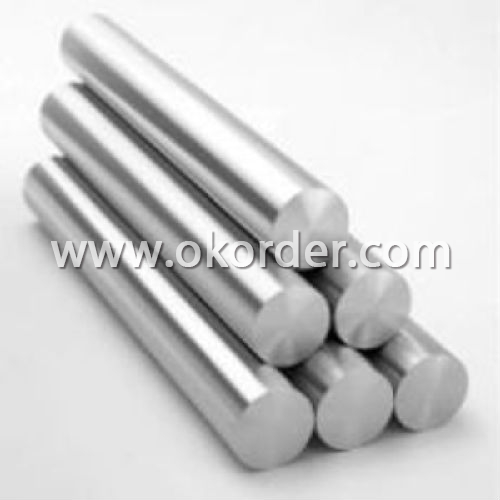
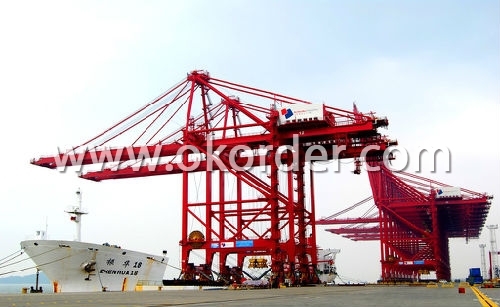
Note:
1. According to national standard (GB) for our products, if not, supply according to national standards (GB) or agreement.
2. We can not only provide electric furnace +LF+VD and electro-slag re-melting (ESR)steel forging materials, but also forging products of piece, bar, etc.
3. Our company is equipped with roll equipment and can provide our customers with roll billets or finished.
4. Please send us your detailed specifications when inquire. We will reply to you ASAP.
- Q: What are the different powder coating techniques used for special steel?
- There are several powder coating techniques used for special steel, including electrostatic spray, fluidized bed, and flame spraying. Each technique offers unique advantages and is chosen based on factors such as the desired coating thickness, complexity of the surface, and specific properties required for the steel's functionality.
- Q: What is the difference between general steel and special steel?
- Pu steel: full name ordinary steel, mostly with plates, profiles and wire form. Ordinary steel is the basic material of the earliest, the largest amount of use in industry, widely used in architectural structure, bridge components, hull structure, transportation, machinery manufacturing, agriculture, textile, defense industry, metal products, food industry, household appliances and other various departments of the national economy.
- Q: How is high-temperature steel used in the production of furnace components?
- High-temperature steel is used in the production of furnace components due to its exceptional heat resistance and strength. It can withstand the extreme temperatures inside the furnace without losing its structural integrity, making it ideal for constructing furnace walls, tubes, and other critical components. Additionally, high-temperature steel helps maintain a stable and efficient heating environment, ensuring optimal performance and longevity of the furnace.
- Q: What are the different grades and specifications of special steel?
- Special steel refers to a wide range of high-quality steels that are specifically designed to possess exceptional properties and meet specific requirements for various industrial applications. These grades and specifications of special steel are determined based on their composition, mechanical properties, and intended use. One commonly used grading system for special steel is the AISI-SAE system, which categorizes special steel into different grades based on their chemical composition. For example, AISI-SAE 4140 is a popular grade of special steel known for its high strength, toughness, and wear resistance. It contains elements such as chromium, molybdenum, and carbon, which contribute to its exceptional properties. Another widely used grading system is the ASTM system, which classifies special steel based on their mechanical properties and intended use. ASTM A36 is a commonly used grade of special steel that is known for its excellent weldability, toughness, and low carbon content. It is often used in structural applications, such as building construction and bridges. There are also specific grades and specifications of special steel for particular industries or applications. For example, stainless steel is a special steel grade that contains a high percentage of chromium, which provides excellent corrosion resistance. Stainless steel is commonly used in applications where resistance to moisture, chemicals, and high temperatures is required, such as in the food industry or medical equipment manufacturing. Furthermore, tool steel is a special steel grade specifically designed for making cutting and shaping tools. It possesses high hardness, wear resistance, and heat resistance, making it suitable for applications such as machining, forging, or die casting. In addition to these grades, special steel can also be categorized based on their specifications, such as heat treatment requirements, surface finish, or dimensional tolerances. These specifications ensure that the special steel meets the specific requirements of the intended application. Overall, the different grades and specifications of special steel are tailored to meet the diverse needs of various industries and applications, providing superior performance, durability, and reliability.
- Q: What are the main advantages of using special steel in the oil and gas industry?
- The main advantages of using special steel in the oil and gas industry include its high strength, corrosion resistance, and ability to withstand extreme temperatures and pressures. Special steel is specifically designed and manufactured to meet the demanding requirements of the industry, ensuring reliable performance and longevity. It also offers excellent weldability, which is crucial for constructing pipelines and equipment used in oil and gas operations. Additionally, special steel's durability and resistance to fatigue make it ideal for withstanding the harsh conditions and environments encountered in the oil and gas sector.
- Q: Can special steel be used in the chemical industry?
- Yes, special steel can be used in the chemical industry. Special steel, such as stainless steel and corrosion-resistant alloys, are often preferred in the chemical industry due to their high resistance to corrosion, heat, and chemical reactions. These qualities make special steel suitable for various applications including storage tanks, pipelines, reactors, and other equipment used in the production and handling of chemicals.
- Q: How does special steel perform in welding applications?
- Special steel, also known as alloy steel, performs exceptionally well in welding applications. Its unique composition, which includes various alloying elements such as manganese, chromium, and nickel, enhances its weldability and overall performance. The addition of these alloying elements significantly improves the strength, hardness, and corrosion resistance of the steel, making it highly suitable for welding applications. Special steel possesses excellent weldability, allowing for easy fusion and formation of strong and durable weld joints. Furthermore, the alloying elements in special steel also contribute to its heat resistance, making it capable of withstanding high temperatures during the welding process without losing its structural integrity. This property is particularly crucial in applications where welding involves high heat levels or prolonged exposure to extreme temperatures. Moreover, special steel exhibits good ductility and toughness, enabling it to withstand the stresses and strains associated with welding. It can effectively absorb and disperse heat during the welding process, minimizing the risk of distortion or cracking in the welded joints. In addition to its mechanical properties, special steel also offers excellent resistance to corrosion and oxidation. This makes it highly suitable for welding applications in environments where exposure to moisture, chemicals, or harsh weather conditions is a concern. The corrosion resistance of special steel ensures that the welded joints maintain their strength and integrity over time, even in challenging environmental conditions. Overall, the performance of special steel in welding applications is outstanding, owing to its excellent weldability, strength, heat resistance, and corrosion resistance. Its unique composition and properties make it a preferred choice for a wide range of welding projects, including structural fabrication, pipeline construction, automotive manufacturing, and many more.
- Q: How does special steel perform in cryogenic conditions?
- Special steel performs well in cryogenic conditions due to its low ductile-brittle transition temperature, high strength, and good toughness. It maintains its mechanical properties and resists cracking or fracture at extremely low temperatures, making it suitable for various applications such as liquefied natural gas (LNG) storage tanks, aerospace components, and cryogenic research equipment.
- Q: What are the different shot blasting techniques used for special steel?
- There are several shot blasting techniques used for special steel, including wheel blasting, air blasting, and centrifugal blasting.
- Q: Can special steel be used in tool manufacturing?
- Yes, special steel can be used in tool manufacturing. Special steel refers to a category of steel that has specific properties and characteristics that make it suitable for various applications, including tool manufacturing. Special steel is often alloyed with other elements such as chromium, molybdenum, or vanadium to enhance its strength, hardness, and wear resistance. In tool manufacturing, special steel is commonly used for making cutting tools, drills, dies, molds, and other tooling components. Its high strength and hardness allow it to withstand the demanding conditions of cutting, drilling, and shaping various materials. Special steel also offers excellent resistance to wear, heat, and corrosion, making it ideal for tools that need to maintain their sharpness and performance over prolonged use. Moreover, special steel can be further processed and treated through heat treatment techniques such as quenching and tempering to achieve specific hardness levels and improve its overall performance. This versatility makes special steel a preferred choice for tool manufacturers who prioritize durability, precision, and longevity in their products. Overall, special steel has proven to be a reliable and efficient material in tool manufacturing, enabling the production of high-quality tools that meet the needs of various industries, from automotive and aerospace to construction and manufacturing.
1. Manufacturer Overview
| Location | Jiangsu, China |
| Year Established | 1990 |
| Annual Output Value | Above US$ 20 Million |
| Main Markets | Mid East; Eastern Europe; North America |
| Company Certifications |
2. Manufacturer Certificates
| a) Certification Name | |
| Range | |
| Reference | |
| Validity Period |
3. Manufacturer Capability
| a) Trade Capacity | |
| Nearest Port | Shanghai |
| Export Percentage | 20% - 30% |
| No.of Employees in Trade Department | 21-50 People |
| Language Spoken: | English; Chinese |
| b) Factory Information | |
| Factory Size: | Above 100,000 square meters |
| No. of Production Lines | 1 |
| Contract Manufacturing | OEM Service Offered; |
| Product Price Range | High; Average |
Send your message to us
Bearing Steel GCr15
- Loading Port:
- China Main Port
- Payment Terms:
- TT or LC
- Min Order Qty:
- 50MT m.t.
- Supply Capability:
- 500000tons/YEAR m.t./month
OKorder Service Pledge
OKorder Financial Service
Similar products
Hot products
Hot Searches
Related keywords





